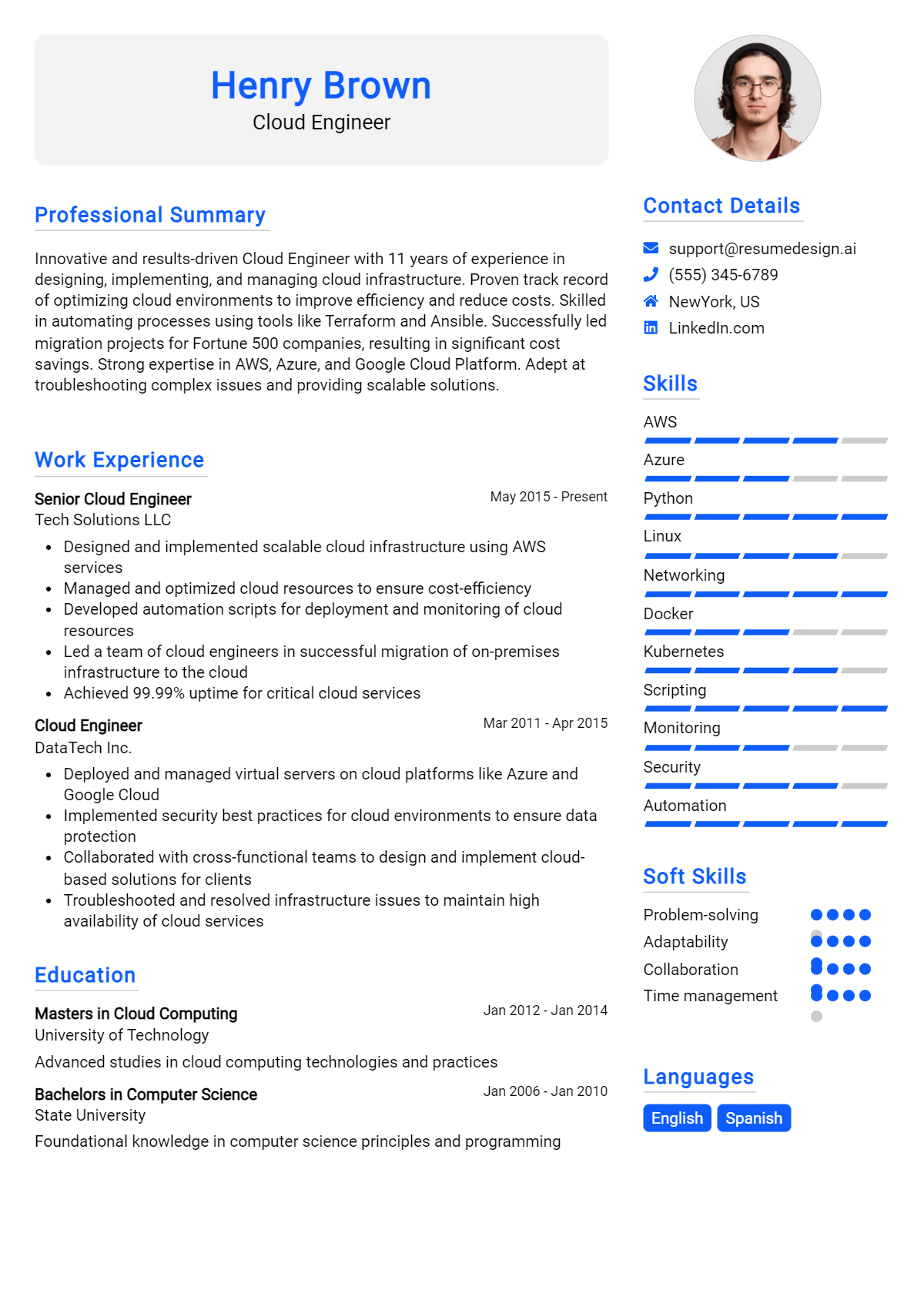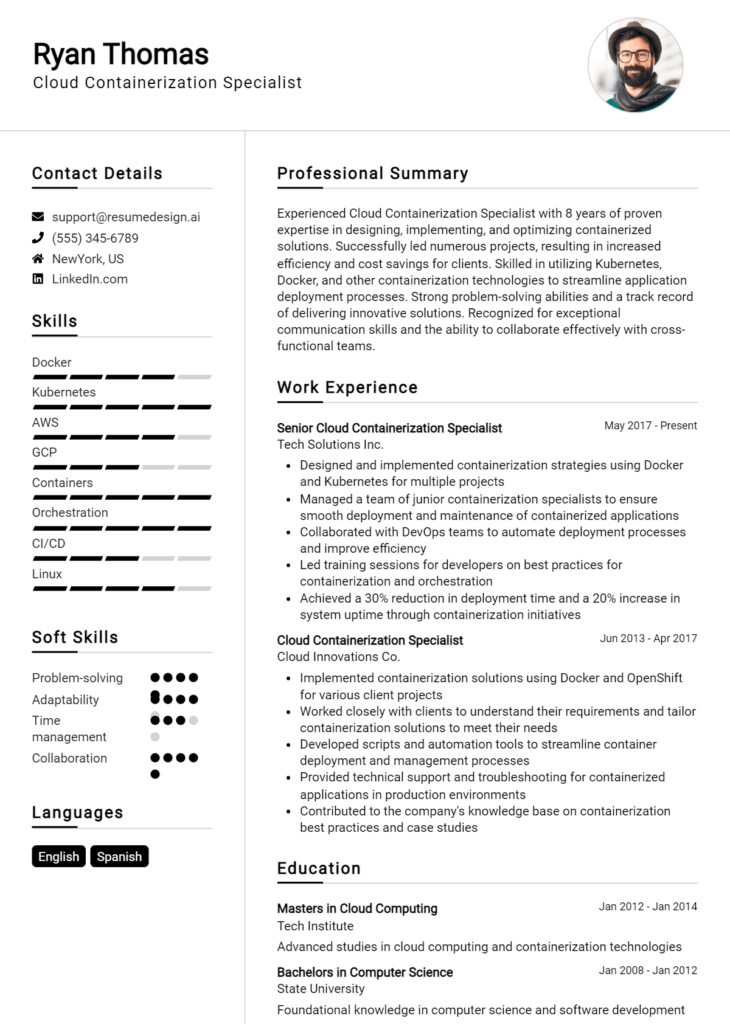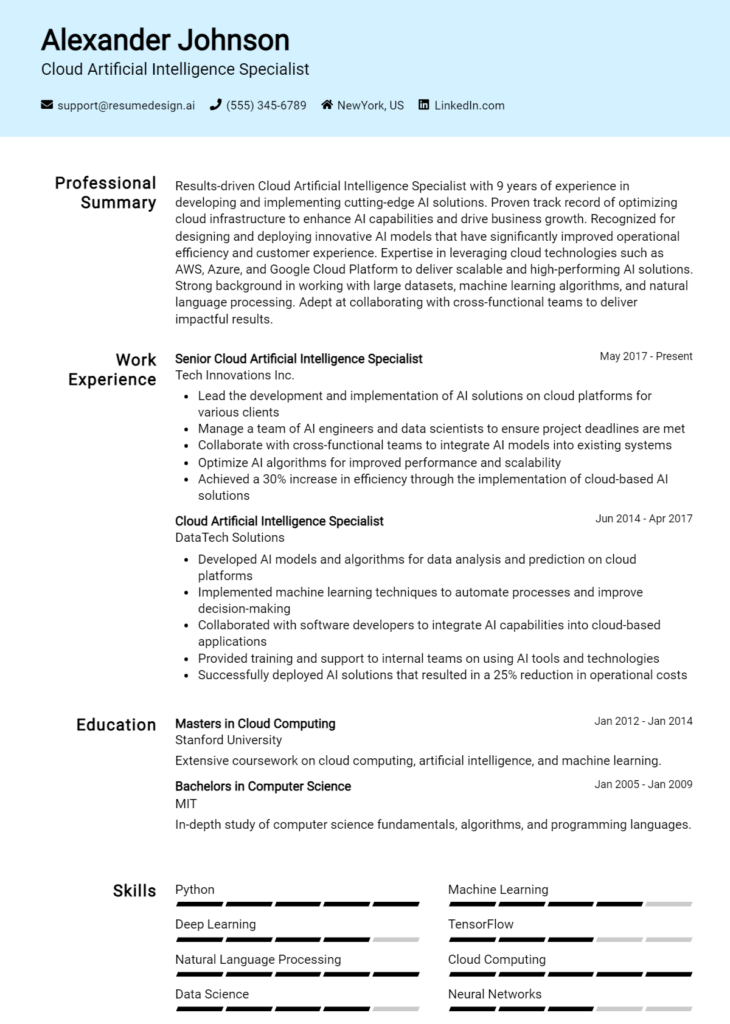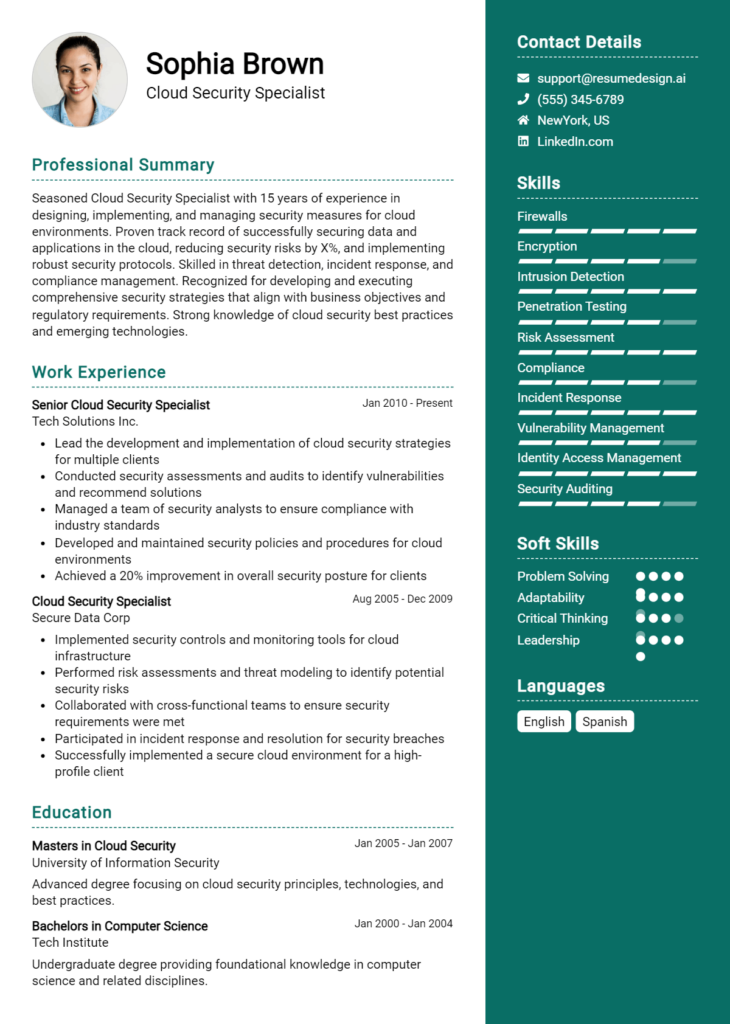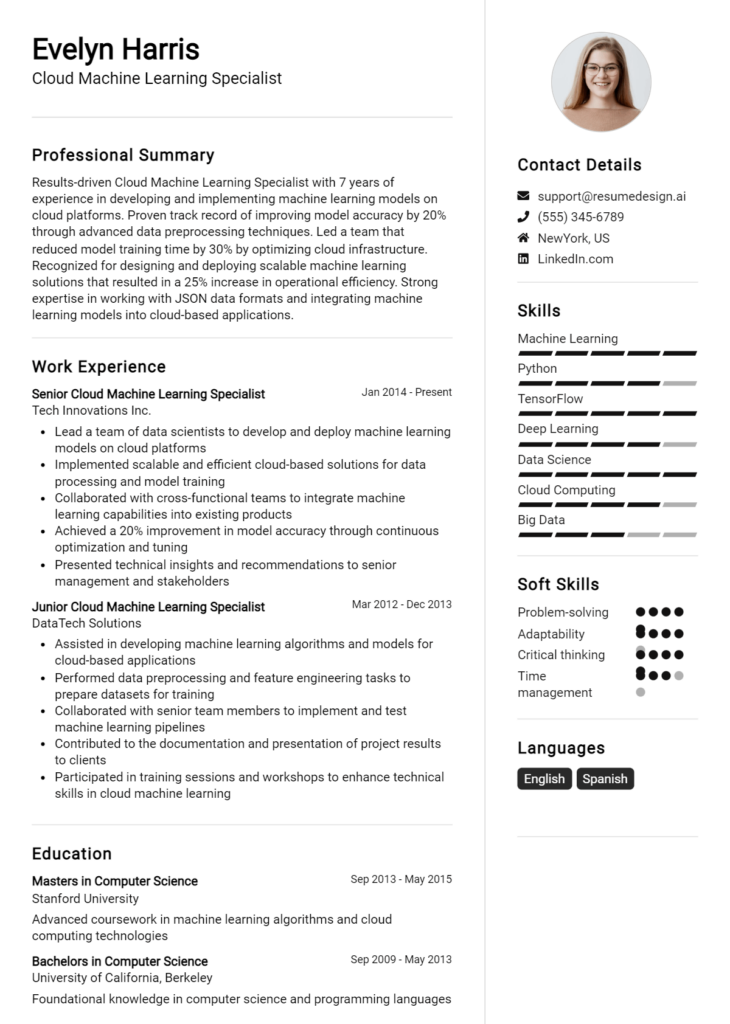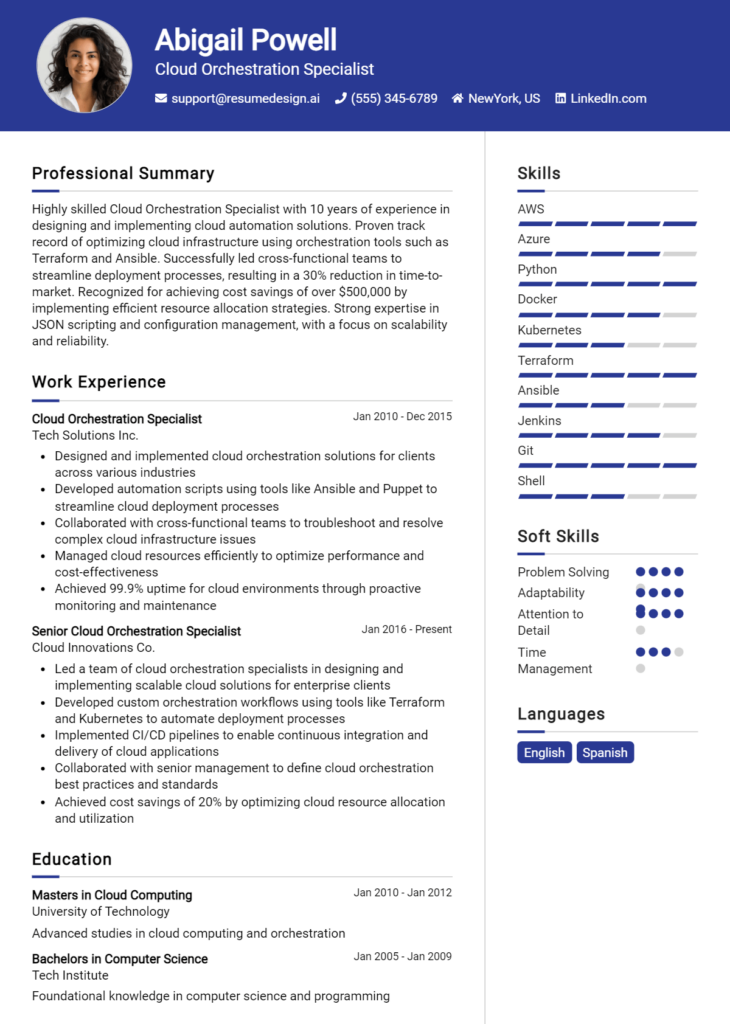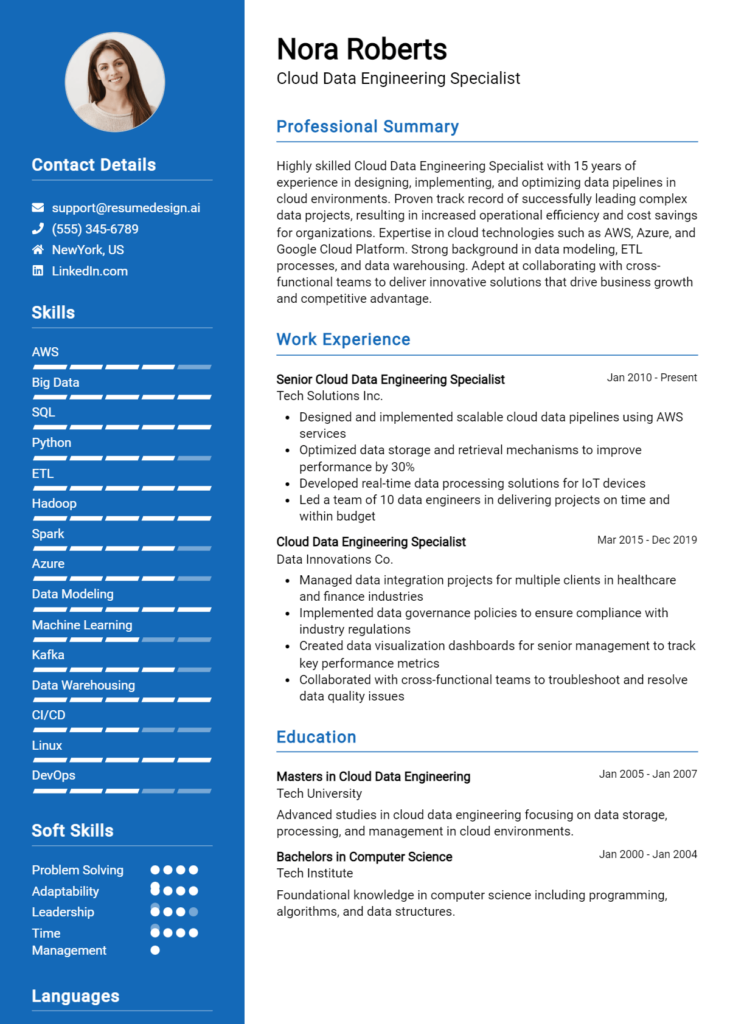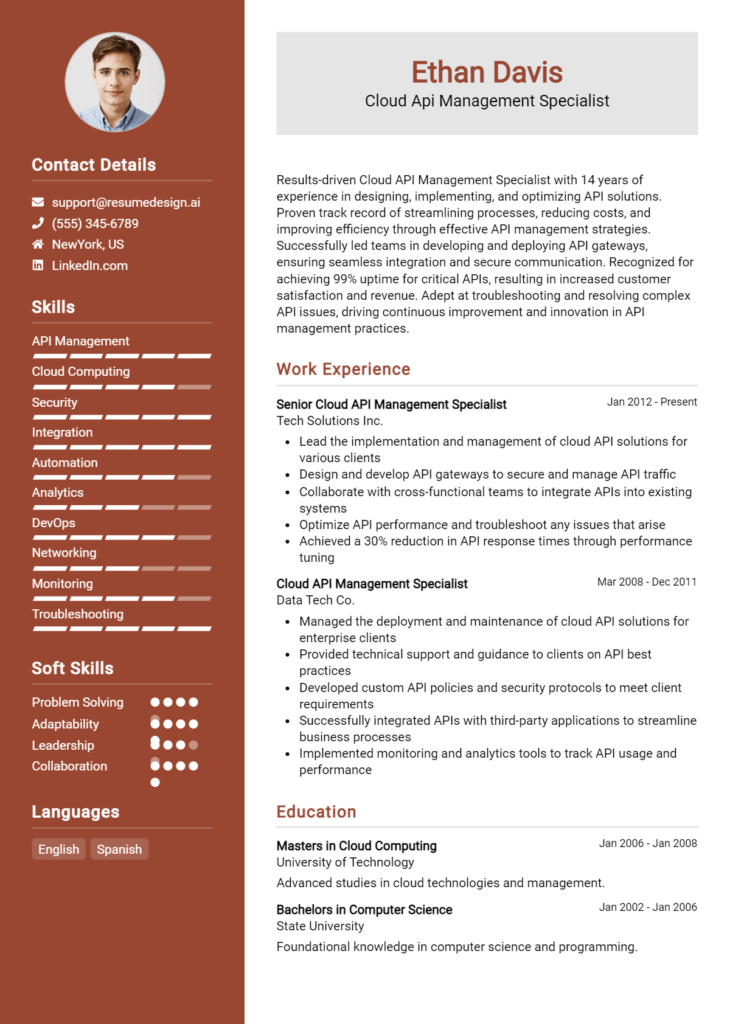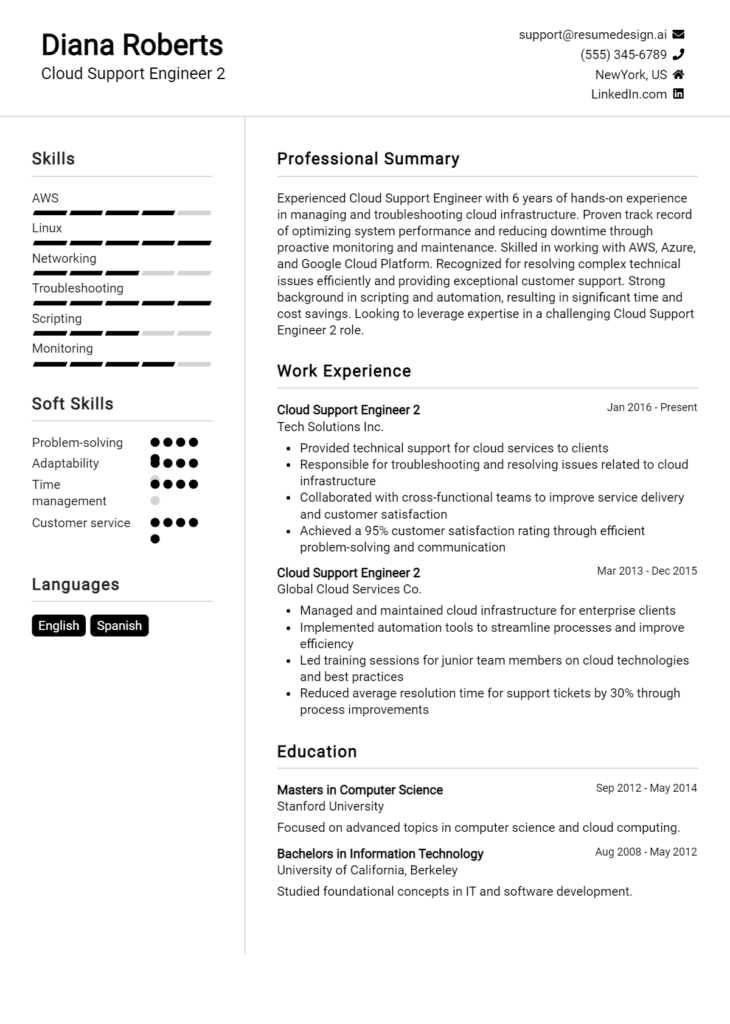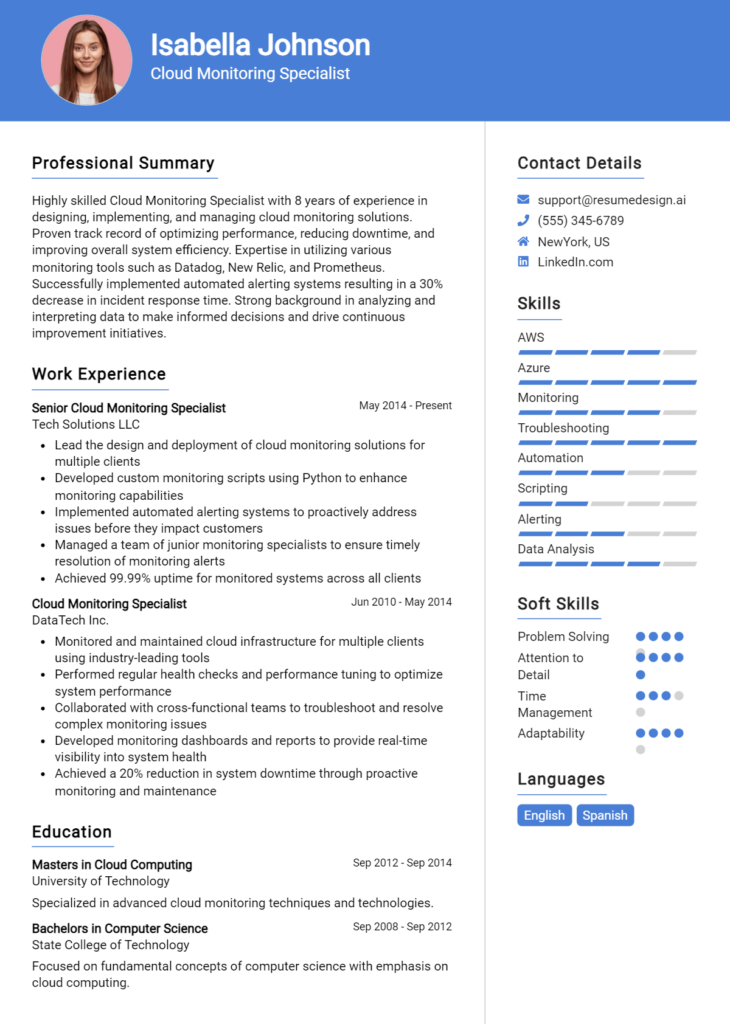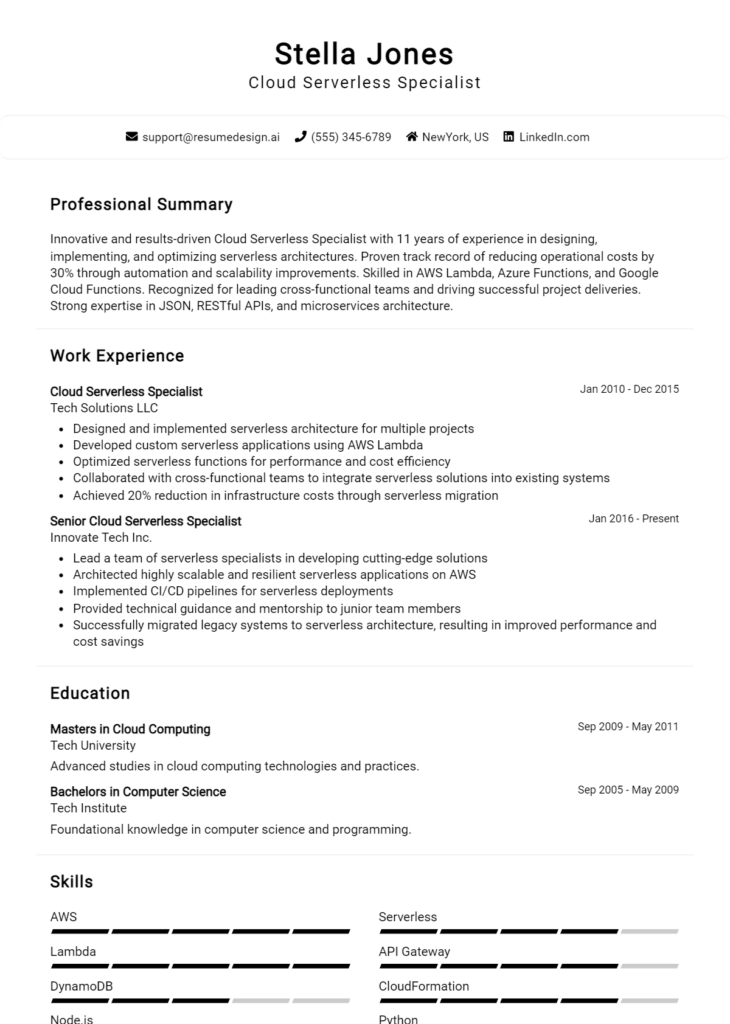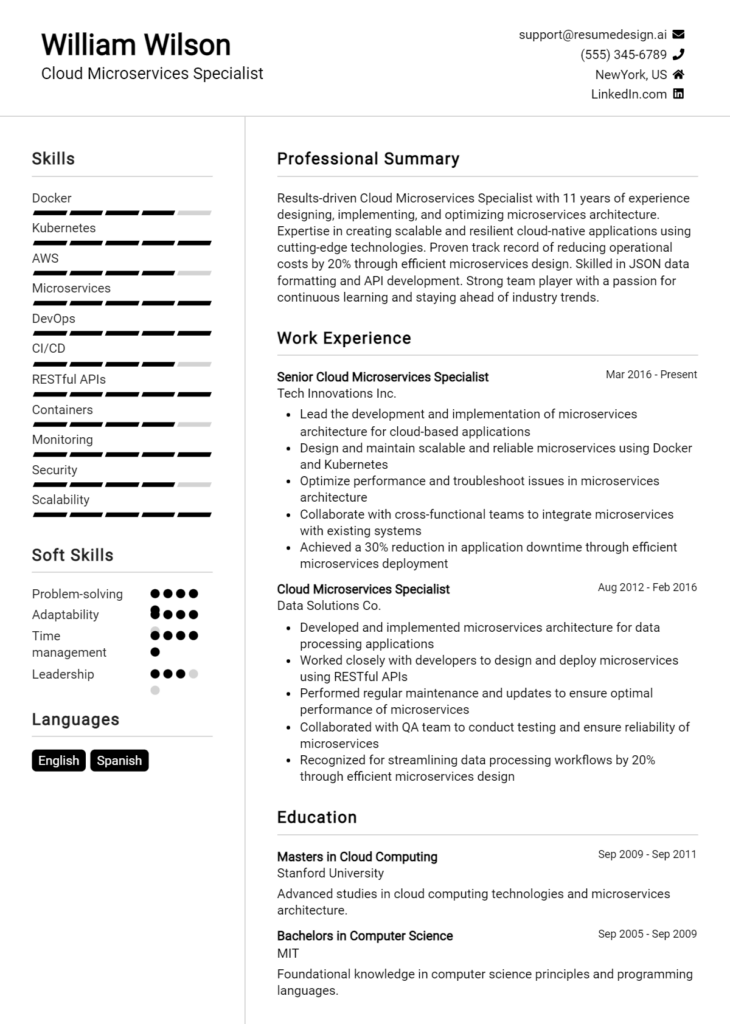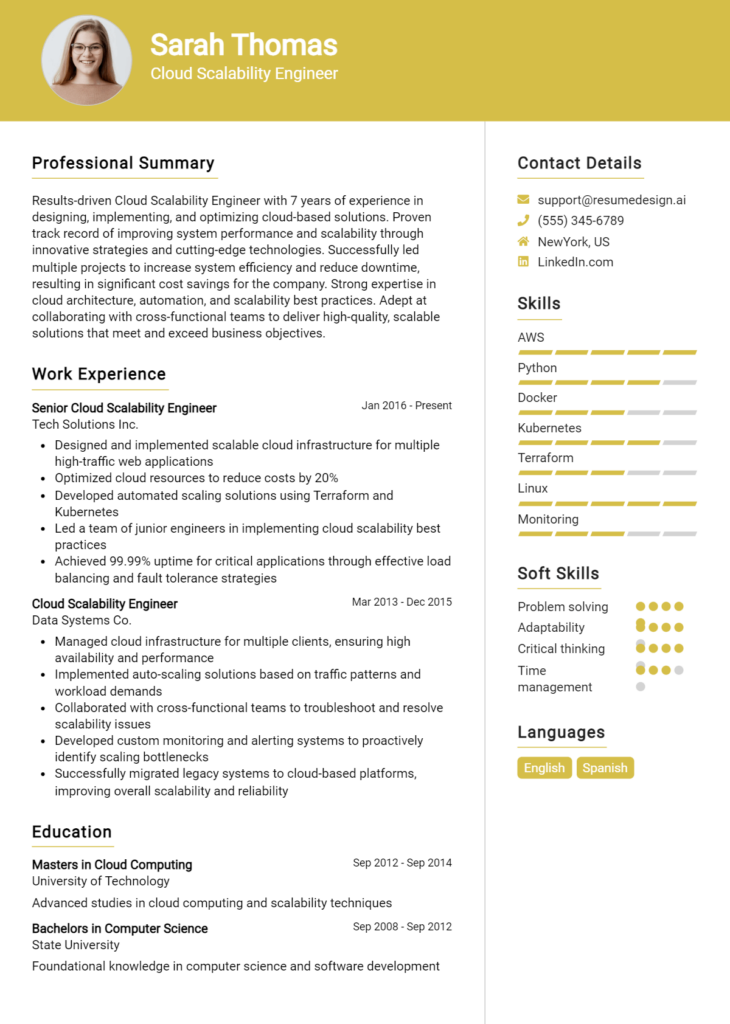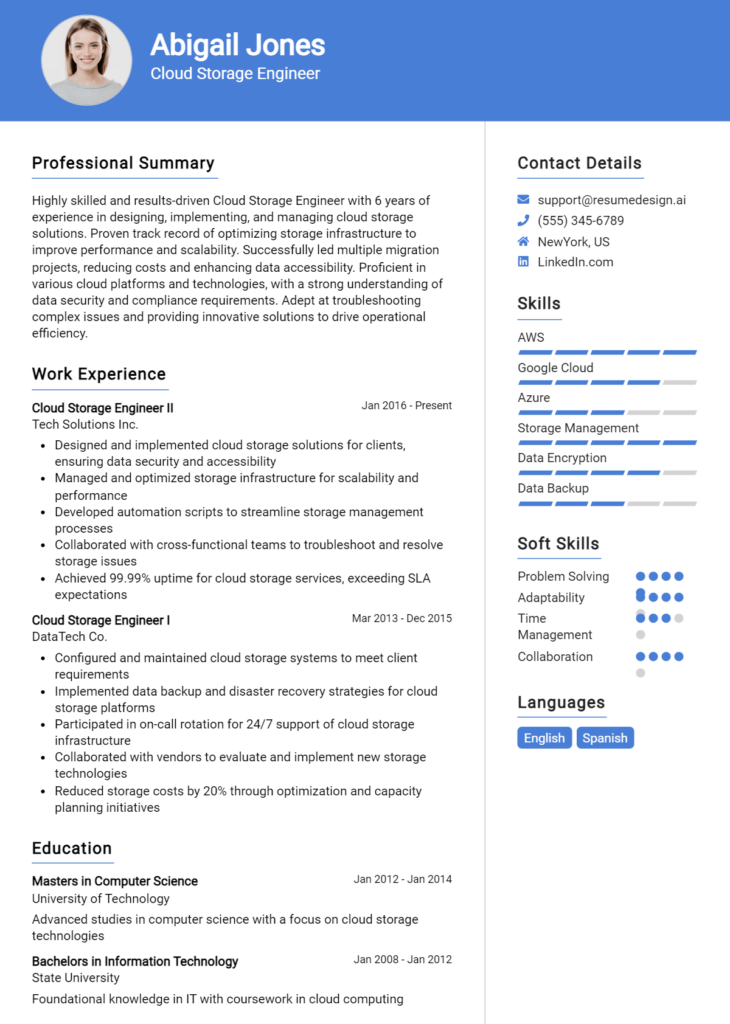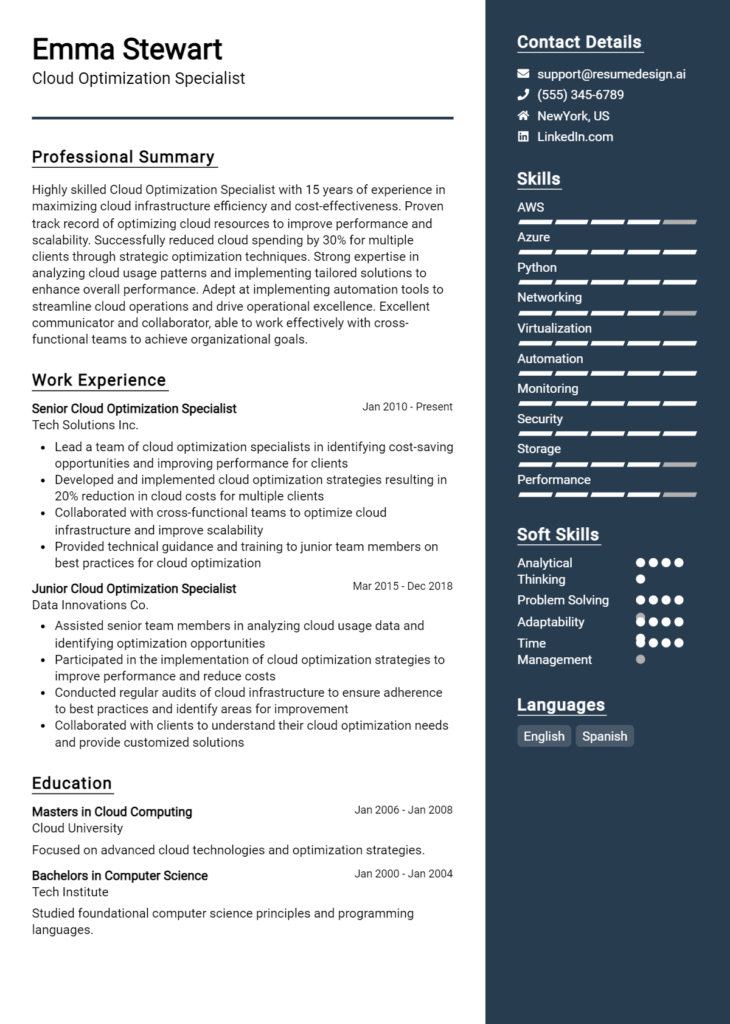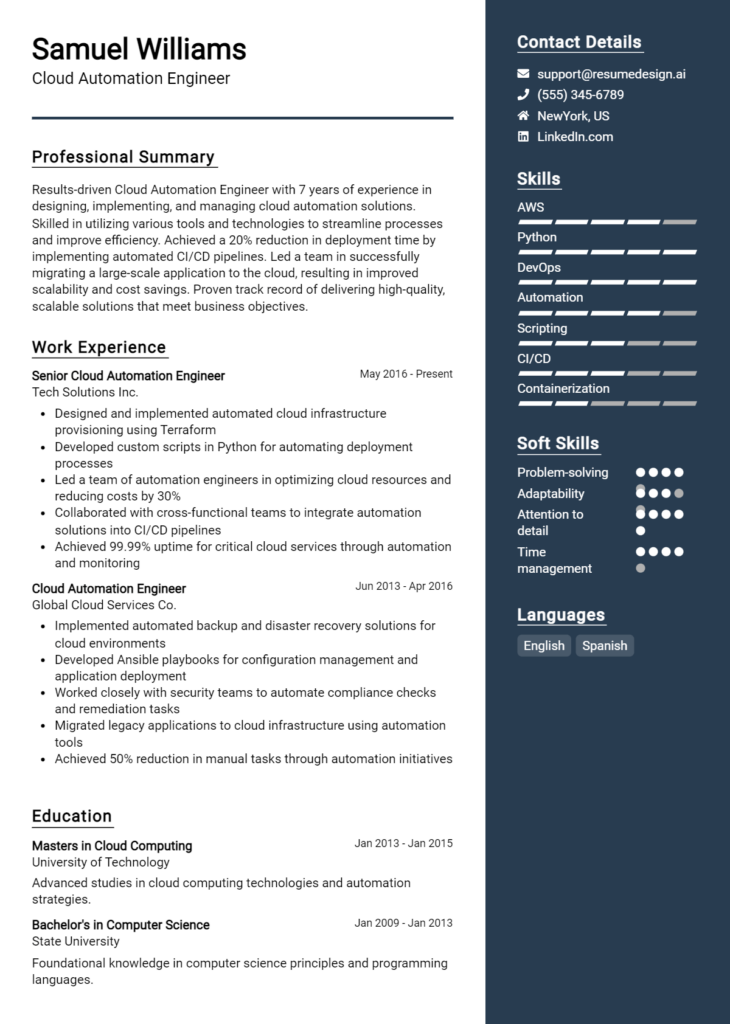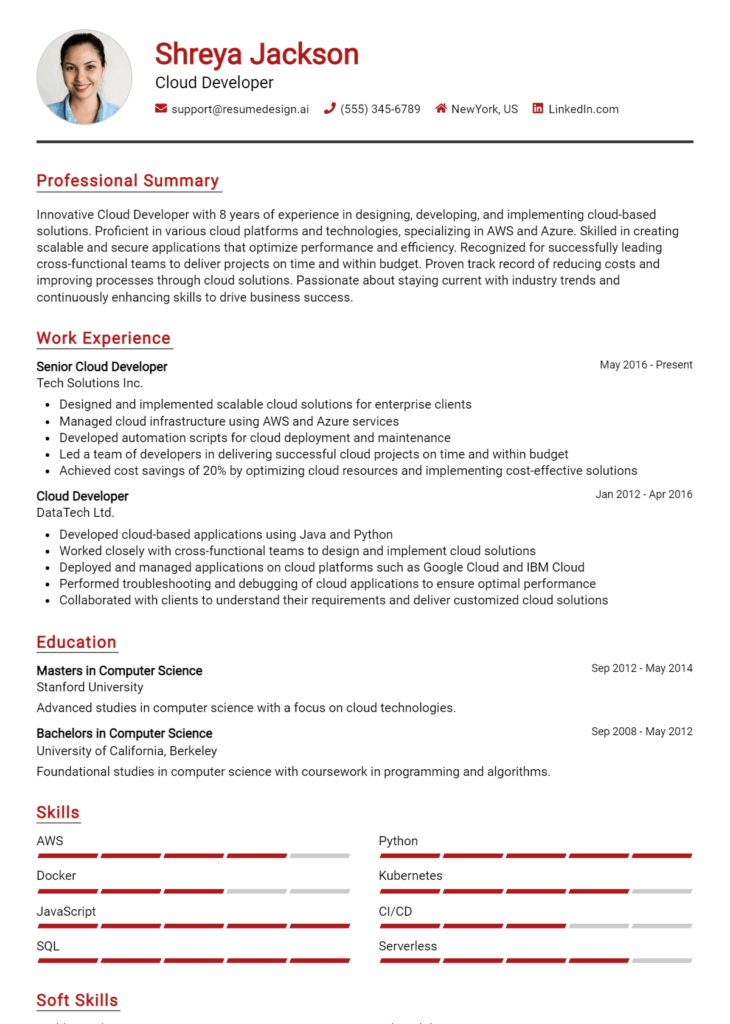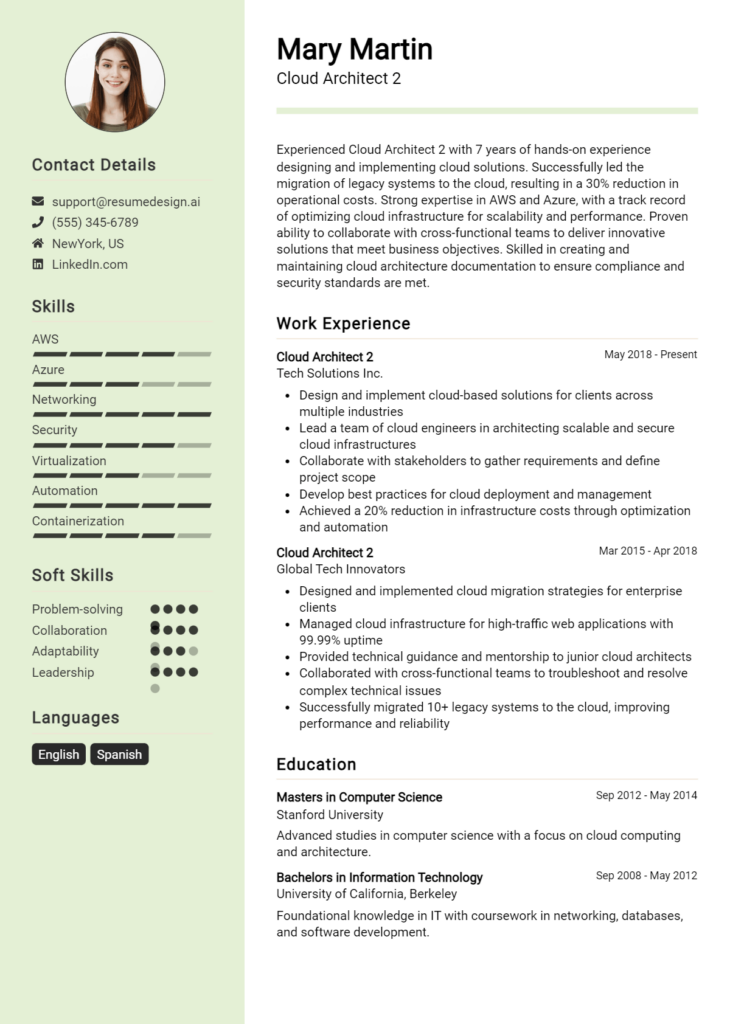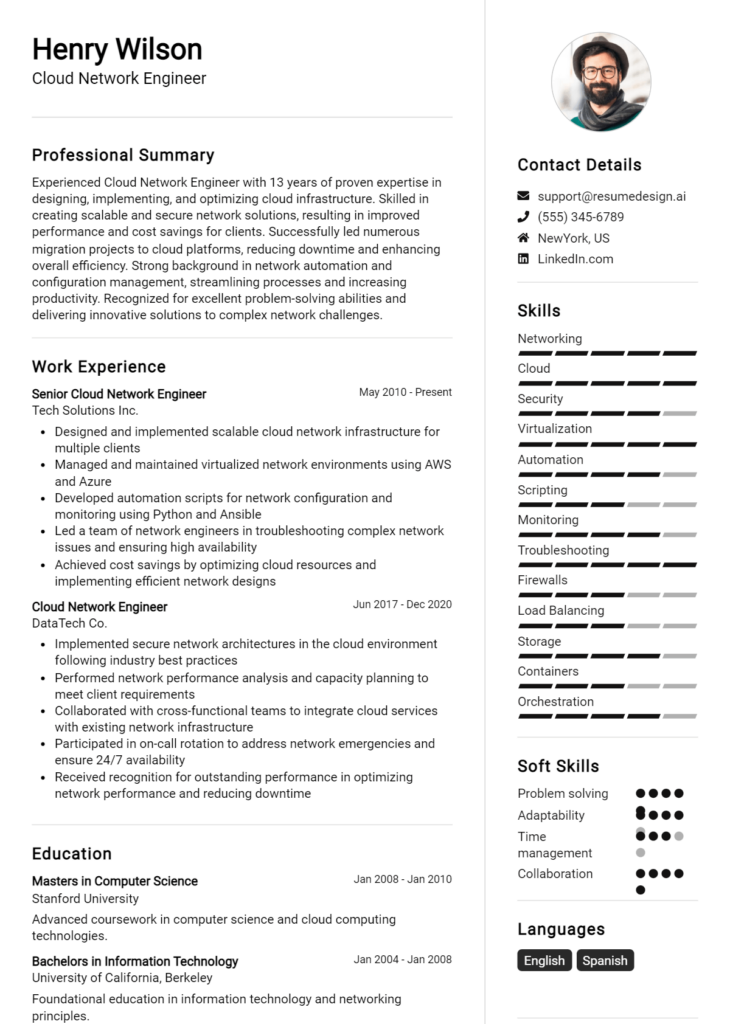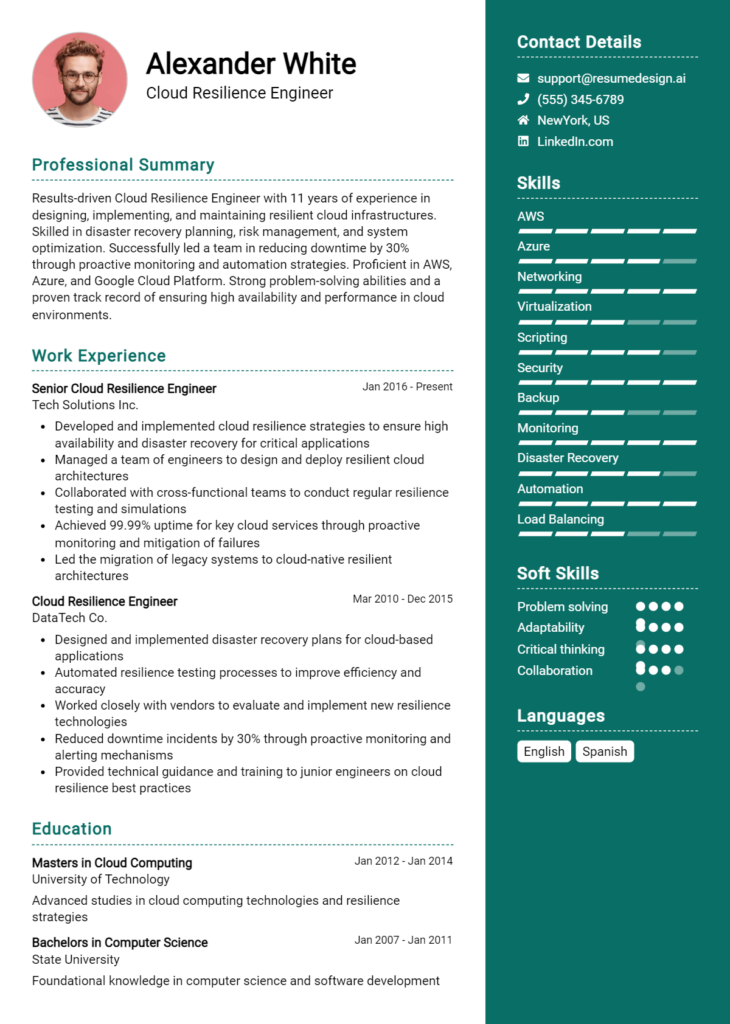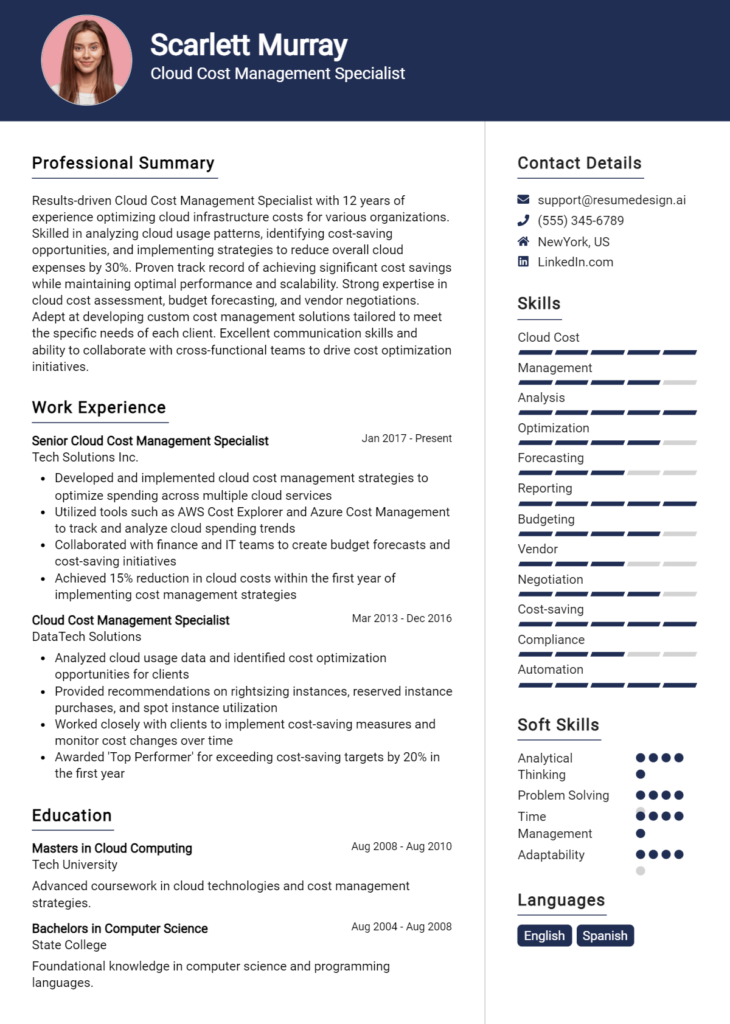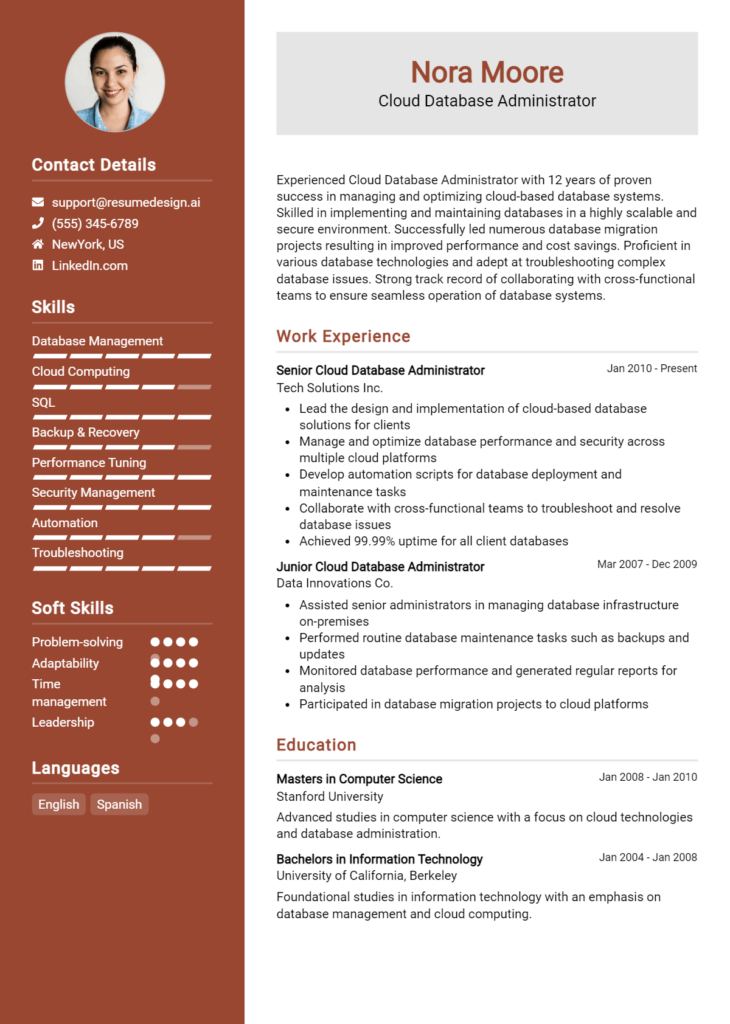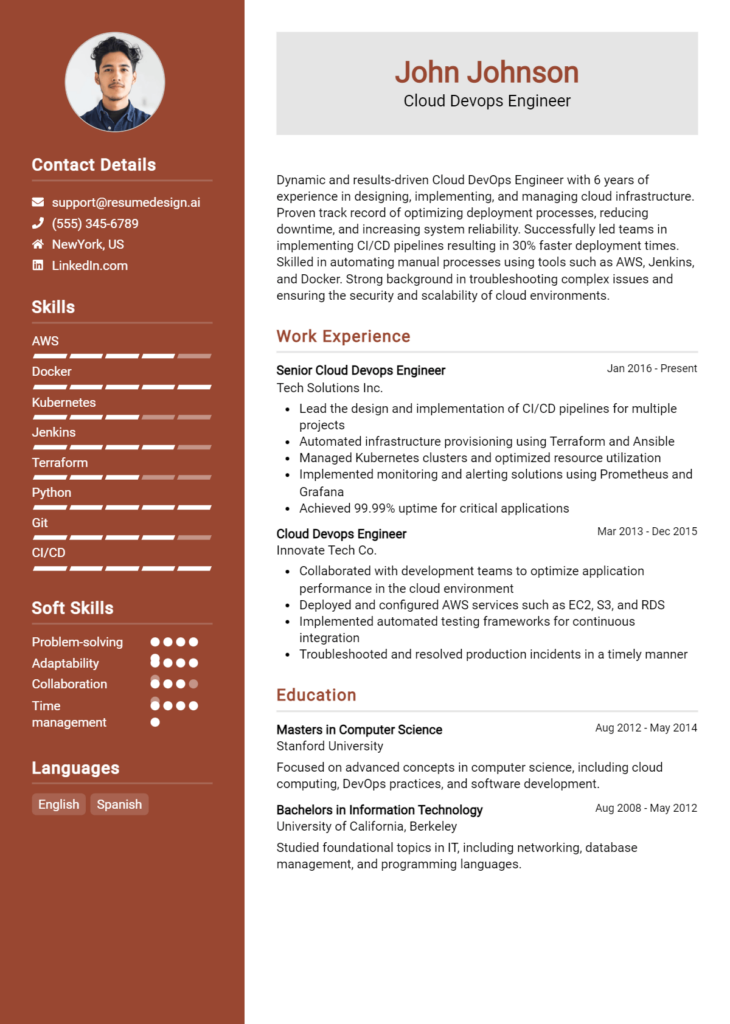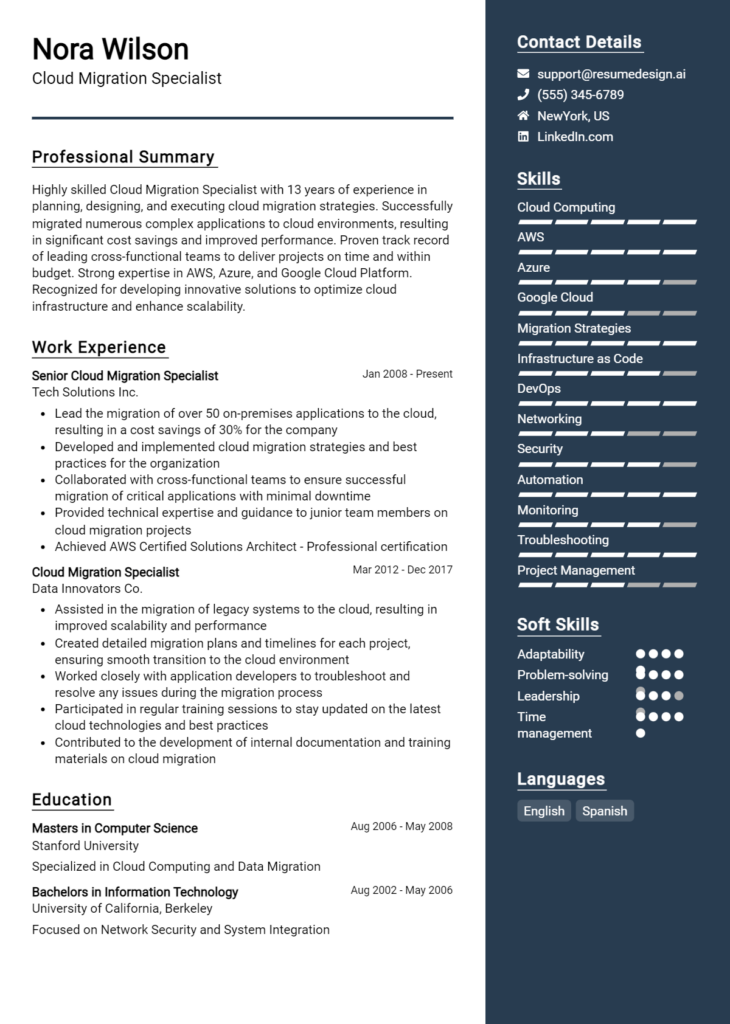Cloud Engineer Core Responsibilities
A Cloud Engineer plays a pivotal role in managing an organization’s cloud infrastructure, requiring a blend of technical expertise, operational knowledge, and strong problem-solving skills. They collaborate across departments, ensuring seamless integration of cloud solutions that align with business objectives. Proficiency in cloud platforms, automation tools, and security protocols is essential. By effectively showcasing these capabilities in a well-structured resume, candidates can highlight their value in driving organizational success and innovation.
Common Responsibilities Listed on Cloud Engineer Resume
- Designing and implementing cloud architectures to meet business needs.
- Managing cloud service providers and optimizing costs.
- Monitoring and troubleshooting cloud environments for performance issues.
- Ensuring data security and compliance with industry standards.
- Automating deployment processes using Infrastructure as Code (IaC).
- Collaborating with development teams to integrate applications into the cloud.
- Conducting regular backups and disaster recovery planning.
- Staying updated on emerging cloud technologies and trends.
- Providing technical support and training to internal teams.
- Documenting cloud architecture and operational procedures.
- Assessing and mitigating risks associated with cloud services.
High-Level Resume Tips for Cloud Engineer Professionals
In today's competitive job market, a well-crafted resume is essential for Cloud Engineer professionals looking to make a strong first impression on potential employers. Your resume is often the initial touchpoint that highlights your skills, certifications, and achievements, serving as a vital marketing tool in showcasing your expertise in cloud technologies. An impressive resume not only reflects your technical capabilities and relevant experience but also demonstrates your understanding of the industry's demands. This guide aims to equip you with practical and actionable resume tips specifically tailored for Cloud Engineer professionals, helping you stand out in a crowded field.
Top Resume Tips for Cloud Engineer Professionals
- Tailor your resume to match the job description, using keywords and phrases that align with the specific requirements of the position.
- Highlight relevant experience in cloud computing, including specific projects, tools, and technologies you've worked with.
- Quantify your achievements by using metrics to illustrate the impact of your contributions (e.g., improved system efficiency by 30%).
- Showcase industry-specific skills such as proficiency in AWS, Azure, or Google Cloud, along with certifications like AWS Certified Solutions Architect or Microsoft Azure Fundamentals.
- Include a dedicated section for technical skills, ensuring it is easy to read and highlights your expertise in cloud architecture, security, and DevOps practices.
- Utilize a clean and professional format that enhances readability, ensuring that key information stands out to hiring managers.
- Incorporate a summary statement that succinctly captures your professional identity and career goals, emphasizing your passion for cloud engineering.
- Focus on continuous learning; mention any recent courses or certifications that demonstrate your commitment to staying updated with industry trends.
- Consider adding links to your online portfolio, GitHub, or LinkedIn profile where hiring managers can explore your work and projects.
By implementing these resume tips, you can significantly increase your chances of landing a job in the Cloud Engineer field. A well-structured and relevant resume not only showcases your technical skills and professional achievements but also positions you as a strong candidate who understands the nuances of cloud computing. Make sure your resume tells your unique story and reflects your potential to contribute meaningfully to prospective employers.
Why Resume Headlines & Titles are Important for Cloud Engineer
In the competitive field of cloud engineering, a well-crafted resume headline or title can serve as the first impression for hiring managers. It acts as a succinct introduction that encapsulates a candidate's key qualifications and strengths in just a few words. A strong headline not only grabs attention but also sets the tone for the rest of the resume, compelling recruiters to delve deeper into the applicant's experience and skills. Therefore, crafting a concise, relevant, and role-specific headline is crucial for making an impactful statement that aligns with the job being applied for.
Best Practices for Crafting Resume Headlines for Cloud Engineer
- Keep it concise: Aim for a headline that is no longer than 10 words.
- Make it role-specific: Use terminology that directly relates to cloud engineering.
- Highlight key skills: Incorporate specific cloud technologies or tools.
- Showcase experience: Mention years of experience or notable achievements.
- Use action-oriented language: Start with verbs that convey impact, such as "Expert" or "Skilled."
- Avoid jargon: Ensure clarity by minimizing complex terminology that may confuse recruiters.
- Tailor for each application: Customize the headline to reflect the job description and requirements.
- Be honest and authentic: Accurately represent your skills and experience to build trust.
Example Resume Headlines for Cloud Engineer
Strong Resume Headlines
Cloud Engineer with 5+ Years of Experience in AWS & Azure Solutions
Certified Cloud Architect Specializing in DevOps and Automation
Results-Driven Cloud Engineer with Expertise in Multi-Cloud Environments
Innovative Cloud Solutions Engineer Focused on Cost Efficiency & Scalability
Weak Resume Headlines
Cloud Engineer
Experienced IT Professional
The strong headlines are effective because they provide specific information about the candidate's experience, skills, and areas of expertise, making it clear to hiring managers what the applicant brings to the table. In contrast, the weak headlines lack specificity and fail to convey any unique qualifications, making them forgettable and ineffective in capturing interest. A compelling headline can be the difference between being noticed or overlooked in a sea of resumes.
Writing an Exceptional Cloud Engineer Resume Summary
In the competitive field of cloud engineering, a well-crafted resume summary acts as a powerful first impression that can significantly influence a hiring manager's decision. A strong summary effectively condenses a candidate’s key skills, experience, and accomplishments into a few impactful sentences, quickly capturing the attention of recruiters. By providing a concise overview of relevant qualifications tailored to the specific job role, candidates can stand out amidst a sea of applications. This strategic approach not only highlights the applicant's expertise but also demonstrates their understanding of the job requirements and the value they can bring to the organization.
Best Practices for Writing a Cloud Engineer Resume Summary
- Quantify achievements: Use numbers and metrics to illustrate your impact, such as cost savings or performance improvements.
- Focus on relevant skills: Highlight technical skills that are specifically mentioned in the job description.
- Tailor your summary: Customize your resume summary for each job application to align with the employer's needs.
- Keep it concise: Aim for 3-5 sentences that are clear and to the point.
- Use action verbs: Start sentences with strong action verbs to convey a sense of accomplishment and proactivity.
- Highlight certifications: Mention relevant cloud certifications (e.g., AWS, Azure, Google Cloud) to showcase your expertise.
- Showcase problem-solving abilities: Include examples of how you’ve addressed challenges in previous roles.
- Maintain professionalism: Use a formal tone that reflects your level of expertise in the field.
Example Cloud Engineer Resume Summaries
Strong Resume Summaries
Dynamic Cloud Engineer with over 5 years of experience in designing and implementing scalable cloud solutions, resulting in a 30% increase in system efficiency. Proficient in AWS and Azure, with a proven track record of optimizing cloud expenses by 25% through effective resource management.
Results-driven Cloud Engineer with expertise in cloud migration and infrastructure management. Successfully led a team to migrate over 50 legacy applications to AWS, reducing operational costs by 40% and improving overall performance metrics.
Innovative Cloud Solution Architect with a focus on security and compliance, holding multiple certifications including AWS Certified Solutions Architect. Spearheaded the implementation of a multi-cloud strategy that decreased downtime by 15% and improved disaster recovery time by 50%.
Dedicated Cloud Engineer with a background in DevOps practices and continuous integration. Enhanced deployment efficiency by 60% through automation tools and scripting, while maintaining a commitment to best practices in cloud security.
Weak Resume Summaries
Cloud Engineer with some experience in cloud technologies and a good understanding of cloud services. Looking for a challenging position.
Experienced IT professional seeking a Cloud Engineer role. Familiar with various cloud platforms and willing to learn more.
The strong resume summaries are considered effective because they provide specific examples of achievements, quantify results, and demonstrate a clear understanding of the cloud engineering role's requirements. In contrast, the weak summaries lack detail, fail to highlight specific skills or accomplishments, and are overly generic, making it difficult for hiring managers to see the candidate's potential value to the organization.
Work Experience Section for Cloud Engineer Resume
The work experience section of a Cloud Engineer resume is vital as it serves as a comprehensive showcase of the candidate's technical skills, project management capabilities, and their ability to deliver high-quality cloud-based solutions. This section provides potential employers with insights into the candidate's hands-on experience in cloud technologies, their ability to lead teams, and their track record of successful project completions. By quantifying achievements and aligning experiences with industry standards, candidates can effectively demonstrate their value and fit for the role, making this section a key component of a compelling resume.
Best Practices for Cloud Engineer Work Experience
- Highlight relevant cloud technologies and tools used in previous roles.
- Quantify achievements with metrics, such as cost savings, performance improvements, or project timelines.
- Describe specific projects that demonstrate technical expertise and problem-solving skills.
- Emphasize collaborative efforts and team leadership in cloud initiatives.
- Align experiences with job descriptions to showcase relevance.
- Use action verbs to convey a sense of proactivity and impact.
- Include certifications and training that complement your work experience.
- Keep descriptions concise and focused on outcomes.
Example Work Experiences for Cloud Engineer
Strong Experiences
- Led a cross-functional team to migrate over 200 on-premise applications to AWS, resulting in a 30% reduction in operational costs and a 40% improvement in application performance.
- Developed and implemented a cloud security strategy that decreased security incidents by 25% and ensured compliance with industry regulations.
- Designed a serverless architecture that enhanced scalability and reduced deployment time by 50%, significantly improving the overall user experience.
- Collaborated with DevOps teams to automate CI/CD pipelines, reducing deployment time from hours to minutes and increasing the release frequency by 60%.
Weak Experiences
- Worked on cloud projects that involved various technologies.
- Participated in team meetings related to cloud strategy.
- Helped implement cloud solutions for some clients.
- Assisted in troubleshooting cloud-related issues.
The examples presented highlight the difference between strong and weak experiences. Strong experiences are characterized by specific, quantifiable outcomes and a clear demonstration of technical leadership and collaboration. They provide concrete evidence of the candidate's capabilities and contributions to successful projects. In contrast, weak experiences tend to be vague and lack detail, failing to convey the candidate's impact or relevance to the cloud engineering field. This distinction is crucial for effectively communicating one's qualifications to potential employers.
Education and Certifications Section for Cloud Engineer Resume
The education and certifications section of a Cloud Engineer resume is crucial as it showcases the candidate's academic background, industry-relevant certifications, and commitment to continuous learning. This section not only provides potential employers with insight into the candidate's formal education but also highlights any specialized training or coursework that aligns with the requirements of the cloud engineering role. Including relevant certifications, especially those recognized in the industry, enhances the candidate's credibility, demonstrating their expertise and readiness to tackle the challenges of cloud computing environments.
Best Practices for Cloud Engineer Education and Certifications
- Prioritize certifications from well-known providers like AWS, Microsoft Azure, or Google Cloud Platform.
- Include relevant coursework that directly relates to cloud technologies, networking, and security.
- Detail advanced degrees, such as a Master's in Computer Science or Information Technology.
- Highlight any ongoing education efforts, such as workshops, seminars, or online courses.
- Use clear and concise formatting to make this section easy to read.
- Tailor the education and certifications section to match the specific job requirements.
- Include dates of completion to show the currency of your knowledge and skills.
- Consider adding a brief description of each certification to convey its significance.
Example Education and Certifications for Cloud Engineer
Strong Examples
- Bachelor of Science in Computer Science, University of Technology, 2020
- AWS Certified Solutions Architect – Associate, 2023
- Google Cloud Professional Cloud Architect, 2022
- Relevant Coursework: Cloud Computing, Network Security, and DevOps Practices
Weak Examples
- Associate Degree in General Studies, Community College, 2015
- Certification in Basic Computer Skills, 2014
- Outdated Cisco Certified Network Associate (CCNA), 2019
- High School Diploma, 2012
The strong examples are considered effective as they directly relate to the skills and knowledge required for a Cloud Engineer, showcasing relevant degrees and current certifications that are recognized in the industry. In contrast, the weak examples lack relevance to the cloud engineering field, featuring outdated or overly general qualifications that do not demonstrate the candidate's preparedness for the role. This distinction is vital for attracting the attention of potential employers, who seek candidates with targeted and applicable educational backgrounds.
Top Skills & Keywords for Cloud Engineer Resume
In the fast-evolving landscape of cloud computing, having a well-crafted resume is essential for a Cloud Engineer. The inclusion of relevant skills not only highlights your technical expertise but also showcases your ability to adapt and thrive in a dynamic environment. Employers look for a blend of hard and soft skills that demonstrate your proficiency in cloud technologies and your capacity to collaborate effectively with cross-functional teams. A strong emphasis on these skills can significantly enhance your chances of landing an interview. For more details on how to effectively showcase your skills, you can explore our guide on skills.
Top Hard & Soft Skills for Cloud Engineer
Soft Skills
- Problem-solving
- Communication
- Team collaboration
- Adaptability
- Time management
- Critical thinking
- Attention to detail
- Creativity
- Leadership
- Conflict resolution
Hard Skills
- Cloud service platforms (AWS, Azure, Google Cloud)
- Infrastructure as Code (IaC) tools (Terraform, CloudFormation)
- Containerization (Docker, Kubernetes)
- Networking knowledge (TCP/IP, VPN, DNS)
- Scripting languages (Python, Bash, PowerShell)
- Security best practices in cloud environments
- Monitoring and logging tools (CloudWatch, ELK Stack)
- CI/CD pipelines (Jenkins, GitLab CI)
- Database management (SQL, NoSQL)
- Virtualization technologies (VMware, Hyper-V)
Incorporating these skills into your resume can greatly enhance your appeal to potential employers, along with demonstrating your relevant work experience in the field.
Stand Out with a Winning Cloud Engineer Cover Letter
Dear [Hiring Manager's Name],
I am excited to apply for the Cloud Engineer position at [Company Name] as advertised on [where you found the job listing]. With a strong background in cloud architecture and a passion for leveraging technology to solve complex problems, I am confident in my ability to contribute to your team. My experience with major cloud platforms, including AWS and Azure, combined with my skills in automation and infrastructure as code, positions me well to support [Company Name] in its cloud initiatives.
In my previous role at [Previous Company Name], I successfully led a project to migrate on-premises systems to a scalable cloud environment, resulting in a 30% reduction in operational costs. I utilized tools such as Terraform and Ansible to automate deployment and management processes, significantly improving efficiency and reducing the risk of human error. My collaborative approach enabled me to work closely with cross-functional teams, ensuring that the cloud solutions we implemented aligned with business goals and provided maximum value.
I am particularly drawn to [Company Name] because of its commitment to innovation and excellence in cloud services. I am eager to bring my expertise in cloud security best practices and my dedication to continuous learning to your team. I believe my proactive mindset and problem-solving abilities will help me thrive in the dynamic environment at [Company Name], where I can contribute to designing and implementing robust cloud solutions that meet the needs of your clients.
Thank you for considering my application. I look forward to the opportunity to discuss how my skills and experiences align with the needs of your team. I am excited about the possibility of contributing to [Company Name] and helping drive your cloud strategy forward.
Sincerely,
[Your Name]
[Your Contact Information]
[LinkedIn Profile or Website, if applicable]
Common Mistakes to Avoid in a Cloud Engineer Resume
When crafting a resume for a Cloud Engineer position, it's crucial to showcase your technical expertise and relevant experience. However, many candidates make common mistakes that can hinder their chances of landing an interview. Avoiding these pitfalls can significantly enhance the effectiveness of your resume, ensuring that it highlights your qualifications and aligns with industry standards. Here are some key mistakes to steer clear of:
Generic Objective Statements: Using a vague objective statement fails to demonstrate your specific interest in the role and can suggest a lack of focus. Tailor your objective to reflect your career goals and the value you bring to the company.
Overloading with Technical Jargon: While technical skills are essential, too much jargon can alienate HR personnel who may not be familiar with specific terms. Balance your technical language with clear explanations to ensure your resume is accessible.
Neglecting Soft Skills: Focusing solely on technical abilities can overlook the importance of soft skills like communication, teamwork, and problem-solving. Highlighting these skills can show your capability to work effectively within a team and with clients.
Not Quantifying Achievements: Providing vague descriptions of responsibilities without quantifying achievements can weaken your impact. Use metrics and specific examples to illustrate how your contributions made a difference in past roles.
Inconsistent Formatting: An unorganized or inconsistent layout can make your resume difficult to read. Ensure consistent font sizes, bullet points, and spacing to create a professional appearance.
Ignoring Relevant Certifications: Overlooking to mention industry-recognized certifications such as AWS Certified Solutions Architect or Google Cloud Professional can be a missed opportunity. Clearly list relevant certifications to enhance your credibility.
Including Irrelevant Experience: Filling your resume with unrelated job experiences can dilute your qualifications. Focus on roles that demonstrate your cloud engineering skills or transferable abilities that relate to the position.
Failing to Tailor for Each Application: Sending out a one-size-fits-all resume can lead to missed opportunities. Customize your resume for each job application, aligning your experiences and skills with the specific requirements of the position.
Conclusion
As we explored the multifaceted role of a Cloud Engineer, it’s clear that this position demands a unique blend of technical skills, problem-solving abilities, and a strong understanding of cloud platforms. From designing scalable cloud infrastructures to ensuring data security, the responsibilities are diverse and ever-evolving. We also highlighted the importance of staying updated with industry trends and certifications, such as AWS Certified Solutions Architect or Google Cloud Professional Cloud Architect, to enhance your career prospects.
In light of these insights, it’s crucial to ensure that your resume effectively reflects your skills and experiences tailored to the Cloud Engineer role. A well-crafted resume can significantly increase your chances of landing interviews and advancing your career.
Now is the perfect time to review your Cloud Engineer resume and make necessary updates. To assist you, we recommend utilizing tools available at resume templates, resume builder, resume examples, and cover letter templates. These resources can help you create a standout application that showcases your expertise and helps you take the next step in your Cloud Engineering career. Don’t wait—elevate your resume today!

